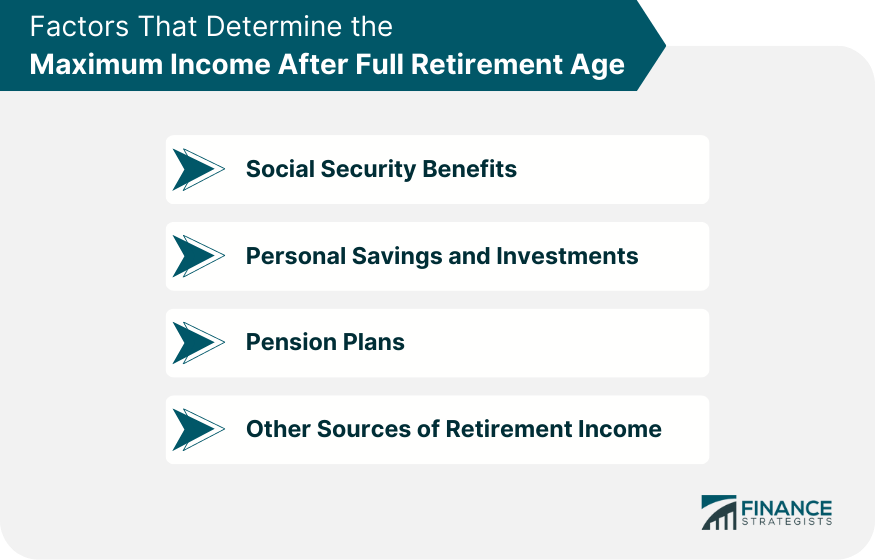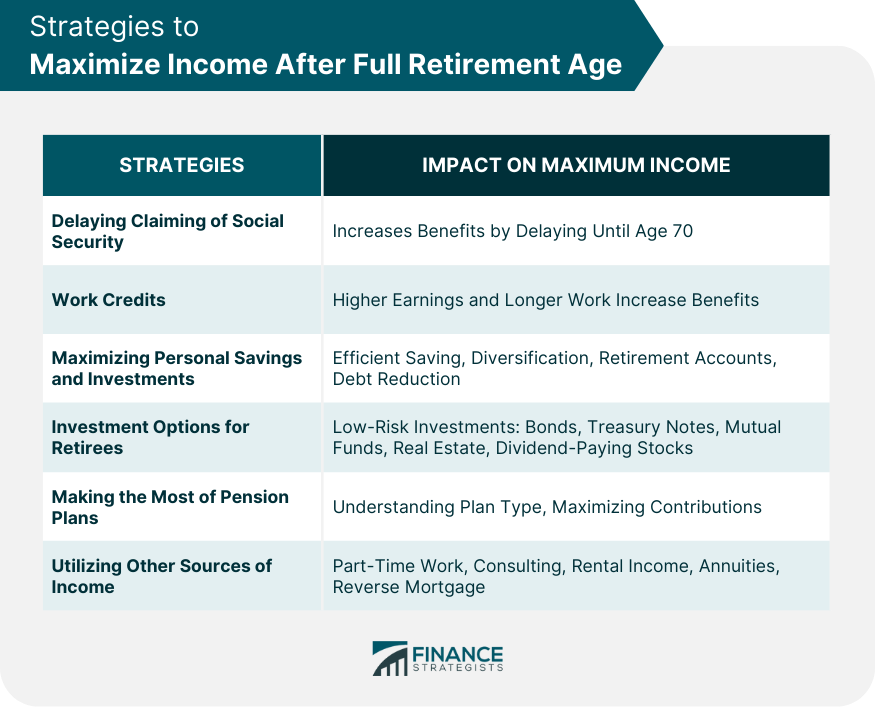The maximum income after Full Retirement Age (FRA) isn't capped, meaning there's no legal or standard limit on how much you can earn. Once you reach your FRA, you're entitled to receive 100% of your Social Security benefits, regardless of your earned income level. Before reaching FRA, if you earn above a certain limit, your Social Security benefits may be reduced. However, after reaching FRA, you can earn as much as you want without affecting these benefits. The total income you can generate after FRA depends on several factors: the amount of your Social Security benefits, income from part-time or full-time work, rental income, investments and dividends, pension payouts, withdrawals from retirement savings accounts, and potentially more. Note that while Social Security benefits aren't reduced due to income after FRA, a portion of your benefits may become taxable if your combined income — including wages, self-employment, interest, and other income — plus half of your Social Security benefits exceeds a certain threshold. 1. Social Security Benefits: The amount of Social Security benefits one can receive at full retirement age is primarily determined by lifetime earnings. The higher your lifetime earnings, the higher your Social Security benefits will be. 2. Personal Savings and Investments: This can significantly contribute to your income after full retirement age. These could be savings accounts, stocks, bonds, mutual funds, or real estate investments. 3. Pension Plans: Both private and public can also influence the maximum income after full retirement age. 4. Other Sources of Retirement Income: Such as rental income, part-time work, consulting fees, and annuities can supplement your retirement income, increasing your maximum potential earnings. You can increase your Social Security benefits by delaying claiming them until age 70. For every year you delay after full retirement age, your benefits increase by a certain percentage. Work credits determine eligibility for Social Security benefits. The more you earn and the longer you work, the higher your benefits will be. Efficient saving strategies before retirement can include automated savings, diversifying your investment portfolio, contributing to a 401(k) or IRA, and reducing debt. Investment options for retirees might include low-risk investments such as bonds and treasury notes, mutual funds, real estate, or dividend-paying stocks. Understanding your pension plan, whether defined benefit or defined contribution and maximizing contributions can significantly boost your retirement income. Part-time work or consulting in your field of expertise can provide additional income without significantly impacting your leisure time. If you own additional property, rental income can be a stable source of retirement income. Annuities provide a steady stream of income during retirement. Additionally, some life insurance policies can also provide retirement income. A reverse mortgage allows homeowners 62 or older to convert part of the equity in their homes into cash, providing another source of income during retirement. The Social Security earnings test can reduce your benefits if you earn over a certain limit before full retirement age. However, after reaching full retirement age, your benefits won't be reduced no matter how much you earn. There's no limit to how much you can earn while receiving Social Security benefits after full retirement age. You can continue to work and earn as much as possible without any reduction in your benefits. Extra income won't affect your Social Security benefits after full retirement age, but it might increase your income taxes. Some of your Social Security benefits might be taxable if your total income exceeds a certain threshold. A common misconception is that earning too much after the full retirement age can reduce your Social Security benefits. In reality, your benefits won't be reduced no matter how much you earn after reaching full retirement age. Another misconception is that retirement income isn't taxable. While Social Security benefits are only partially taxable, other sources of retirement income, such as pensions, annuities, and distributions from retirement accounts, are generally taxable. Retirement planning are essential for financial security in your golden years. It allows you to understand your retirement income sources, estimate your retirement expenses, and devise strategies to maximize your income and minimize your expenses. Retirees can seek advice from financial advisors, attend financial planning seminars, and use online resources to enhance their retirement income and manage their finances effectively. Websites like the Social Security Administration, AARP, and the Financial Industry Regulatory Authority (FINRA) provide valuable resources and tools for retirees. The maximum income after Full Retirement Age (FRA) is not limited, allowing retirees to enhance their earnings through multiple sources. A well-planned retirement strategy can provide financial security, enabling individuals to live comfortably in their later years. This involves understanding how Social Security benefits work, effectively leveraging personal savings, making the most of pension plans, and tapping into diverse income streams such as rental income, part-time work, or annuities. It's essential to dispel common misconceptions, like the belief that retirement income isn't taxable or that earning more can reduce Social Security benefits. Additionally, resources such as financial advisors, retirement planning seminars, and online tools can provide crucial assistance to retirees, helping them manage their finances optimally. Maximizing income after FRA involves a comprehensive understanding of your financial landscape, effective planning, and smart decision-making.What Is the Maximum Income After Full Retirement Age?
Factors That Determine the Maximum Income

How to Maximize Income After Full Retirement Age
Increasing Social Security Benefits
Delaying Claiming of Social Security Until Age 70
Work Credits and Their Impact on Social Security Benefits
Maximizing Personal Savings and Investments
Strategies for Efficient Saving Before Retirement
Investment Options for Retirees
Making the Most of Pension Plans
Utilizing Other Sources of Income
Part-Time Work or Consulting
Rental Income
Annuities and Life Insurance
Reverse Mortgage

Effects of Income on Social Security Benefits After Full Retirement Age
Social Security Earnings Test and Its Implication
How Much You Can Earn While Receiving Social Security Benefits
How Extra Income Affects Your Benefits
Common Misconceptions About Maximum Income After Full Retirement Age
Misunderstanding of Social Security Benefit Reduction
Misconceptions About Taxes and Retirement Income
Planning and Strategies for a Secure Financial Future
Importance of Retirement Planning
Financial Advice and Resources for Retirees
Conclusion
What Is the Maximum Income After Full Retirement Age? FAQs
After reaching full retirement age, there is no cap on the income you can earn without affecting your social security benefits. Your benefits will not be reduced, regardless of your earnings.
One can increase their maximum income after full retirement age by delaying claiming their Social Security benefits until age 70, maximizing personal savings and investments, fully utilizing pension plans, and seeking other income sources such as part-time work, rental income, annuities, and reverse mortgages.
The maximum income after full retirement age is determined by a range of factors, including the amount of Social Security benefits one is entitled to, the sum of personal savings and investments, the details of any pension plans, and other income sources.
Some common misconceptions about the maximum income after full retirement age include the belief that earning too much can reduce your Social Security benefits and that retirement income isn't taxable. In reality, Social Security benefits aren't reduced no matter how much you earn after full retirement age, and most sources of retirement income are indeed taxable.
Understanding the maximum income after full retirement age is crucial for effective retirement planning. It allows individuals to anticipate their financial status in their golden years, make informed decisions about when to retire and how to allocate their resources and strategize on how to maximize their income after retirement.
True Tamplin is a published author, public speaker, CEO of UpDigital, and founder of Finance Strategists.
True is a Certified Educator in Personal Finance (CEPF®), author of The Handy Financial Ratios Guide, a member of the Society for Advancing Business Editing and Writing, contributes to his financial education site, Finance Strategists, and has spoken to various financial communities such as the CFA Institute, as well as university students like his Alma mater, Biola University, where he received a bachelor of science in business and data analytics.
To learn more about True, visit his personal website or view his author profiles on Amazon, Nasdaq and Forbes.











